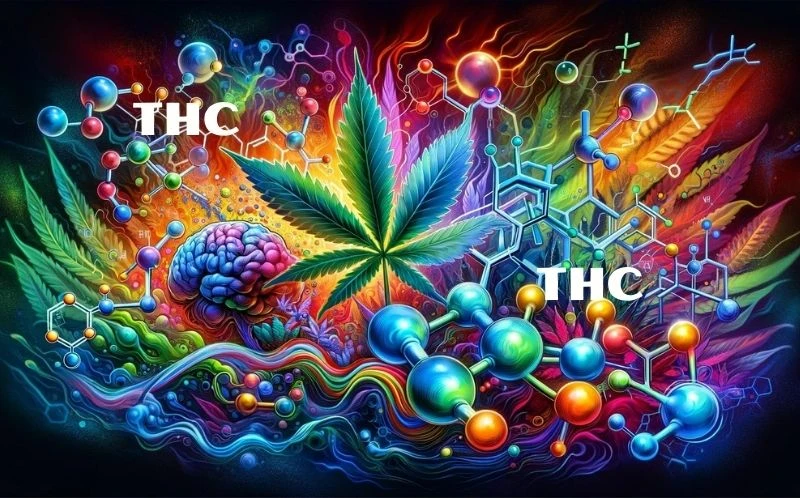Imagine you’re at a family barbecue, and the topic of marijuana legalization pops up. Your curious Aunt Linda, who’s always been a bit conservative, starts asking questions about how marijuana stays in the system. Or perhaps you’re chatting with your friend Joe, who’s considering a new job and worried about a drug test because he tried cannabis at a recent concert. These are the kinds of everyday scenarios where a little knowledge about THC detection can go a long way.
We’re here to simplify the complexities of THC detection, shedding light on how this principal component of marijuana interacts with our system. Let’s clear up the myths and misconceptions about THC detection, offering you straightforward and helpful insights.
What is THC?
THC, or delta-9-tetrahydrocannabinol, might sound like an intimidating term, but it’s simply the ingredient in cannabis that creates the feeling of being high. Whether people smoke, vape, or eat marijuana, THC is the main component responsible for the psychological effects they experience. Beyond its impact on mood, THC interacts with the body in ways that allow it to be detected through various tests.
Why is this important?
Knowing about THC is essential for anyone who wants to understand the effects of marijuana on the body and its detection timeline. Whether you’re a user, thinking about trying it, or just curious, knowing THC is crucial.
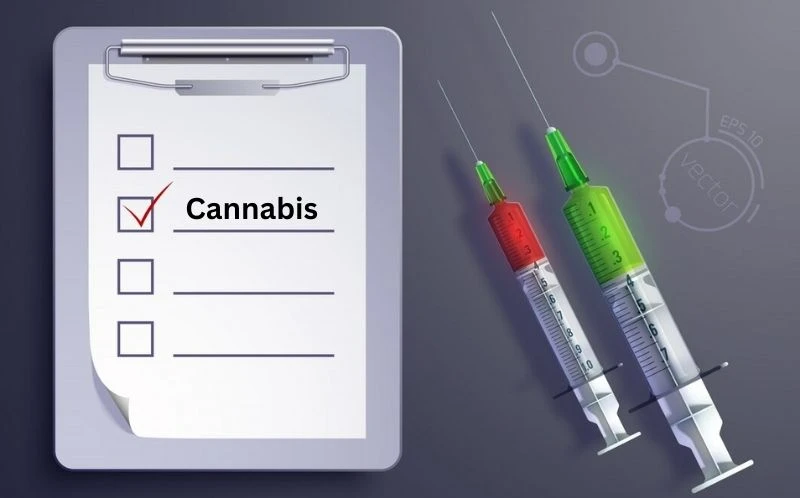
Here's an interesting fact
Despite its notoriety, THC is just one of over 113 cannabinoids identified in cannabis. And when it comes to detection, did you know that THC can linger in your system much longer than the immediate effects last? For instance:
- Weed detection in hair: Up to 90 days from day of use.
- Weed detection in urine: Up to 30 days.
- Weed detection in saliva: Up to 24 hours.
- Weed detection in blood: Up to 12 hours
How Drug Tests Detect Cannabis?
Drug tests for cannabis focus on identifying THC metabolites, the by-products left behind as your body processes THC, rather than THC itself. These metabolites are what linger in the body, offering a traceable marker of cannabis use. They can be found in various bodily tissues and fluids, giving insights into an individual’s marijuana consumption history.
The time these metabolites remain detectable depends on several factors, including usage frequency, the potency of the cannabis consumed, and individual metabolic rates. This variability is why the detection window for cannabis can range widely among different individuals, making it a key consideration for anyone concerned about drug testing.
Types of Drug Tests for Cannabis Detection
1. Urine Tests
Urine testing is the most common method for detecting THC in the system. It’s widely utilized due to its effectiveness in identifying THC metabolites long after the psychoactive effects have subsided. The detection windows can vary significantly based on the frequency and quantity of cannabis use.
According to a 2017 review, here’s how long cannabis may be detectable in urine depending on the usage pattern:
- Single-Use (One Joint, For Example): Detectable for up to 3 days.
- Moderate Use (Four Times Weekly): Detectable for 5–7 days.
- Chronic Use (Daily): Detectable for 10–15 days.
- Chronic Heavy Use (Multiple Times Per Day): Detectable for more than 30 days.
These timelines offer a general guide, but individual factors like metabolism, body fat percentage, and the potency of the cannabis used can influence these detection windows.
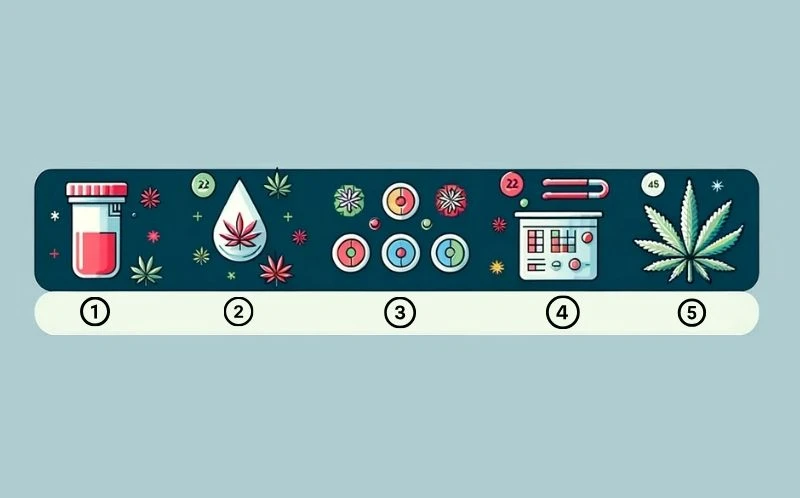
2. Blood Tests
Blood testing is less common and is typically used to detect current impairment or recent use. THC is present in the blood for a short duration, usually a few hours up to 12 hours, but can be detected for longer periods in those who use cannabis more frequently.
3. Saliva Tests
Saliva testing is becoming more popular for roadside testing or immediate detection needs. It can identify THC use within a short window, usually a few hours up to 24 hours, making it suitable for assessing recent consumption.
4. Hair Tests
Hair testing can provide a longer detection window, capturing THC metabolites that enter the hair follicles. It can show cannabis use for up to 90 days, offering a broader view of an individual’s substance use history.
Each of these tests has its own strengths and limitations, with varying detection windows and sensitivities. They are chosen based on the specific circumstances and the information that needs to be obtained about an individual’s cannabis use.
How the Body Processes THC?
When THC enters your body, it triggers a series of complex interactions. Initially absorbed through the lungs if smoked or the digestive tract if ingested, THC then travels through the bloodstream, reaching the brain and other organs, where it produces its psychoactive effects.
Once in the liver, THC is broken down into multiple metabolites, which can be detected in drug tests. One key aspect of THC metabolism is its fat solubility. Unlike substances that dissolve in water, THC binds to fat molecules in the body, which can cause it to remain in your system for an extended period. This is particularly significant for chronic or frequent users, where accumulated THC in fat cells can result in longer detection times.
This process of absorption, distribution, and metabolism is crucial for understanding how long THC can be detected in your system. It’s not just about how much or how often you consume cannabis, but also about how your body handles THC, influenced by factors like metabolism, body fat percentage, and overall health.
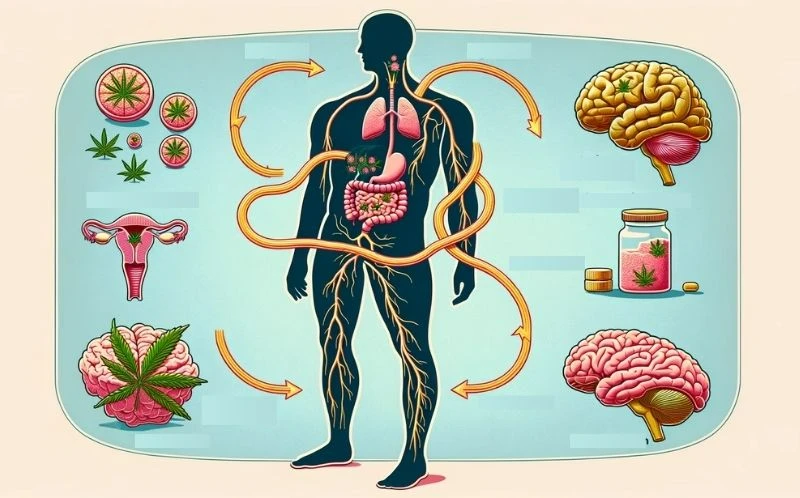
Factors Influencing THC Detection Times
The duration THC remains detectable in your body can vary greatly, influenced by several key factors:
Regular users tend to retain THC in their system longer than occasional users. THC accumulates in fat cells with frequent use, leading to prolonged release and detection times.
The amount of THC consumed plays a significant role. Higher doses can lead to longer detection windows as the body takes more time to break down and eliminate the higher concentration of metabolites.
Since THC is fat-soluble, individuals with higher body fat percentages may experience longer detection times. The metabolites bind to fat cells and are released slowly over time.
Your metabolic rate determines how quickly substances are broken down and eliminated from your body. A faster metabolism can shorten the detection window for THC.
Hydration can influence the concentration of THC metabolites in urine, while diet can affect metabolism and, consequently, the speed at which THC is processed.
General health and liver function impact how efficiently THC is metabolized and eliminated from the body.
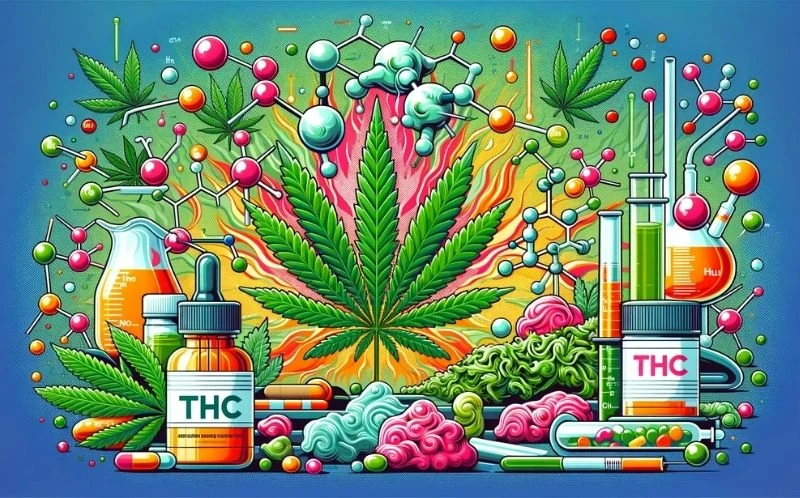
Myths and Realities of Detoxing THC
When it comes to clearing THC from your system, there’s no shortage of advice and purported quick fixes, but it’s crucial to separate fact from fiction.

Myth I
Detox kits can instantly cleanse your body of THC. Many products claim to offer a fast solution to detox THC from your body, promising clean test results in a matter of days. However, the reality is that these kits often only dilute urine temporarily, without truly accelerating the body’s natural detoxification process.
Reality I
The only surefire way to detox from THC is time. Given that THC is fat-soluble and stored in the body’s fat cells, it takes time for it to be fully metabolized and excreted. Hydration, a healthy diet, and exercise can support the body’s natural detox processes, but they can’t drastically speed up the elimination of THC.
Myth II
Drinking excessive amounts of water will cleanse THC metabolites from your system. While staying hydrated is essential for overall health, simply drinking water does not ‘flush out’ THC from the body. Overhydration can even lead to water intoxication and dilute urine samples, which may raise red flags during drug testing.
Reality II
Your body’s metabolism is the key factor in detoxing THC. Everyone’s body processes substances at different rates, influenced by factors like metabolism, body fat percentage, and frequency of cannabis use. There’s no one-size-fits-all timeline for when THC will be undetectable in your system.
Frequently Asked Questions
THC can be detected in urine for up to 3 days after single use, 5-7 days for moderate use, 10-15 days for chronic daily use, and over 30 days for chronic heavy use.
Yes, the more frequently you use cannabis, the longer THC metabolites can be detected in your system.
Yes, since THC is fat-soluble, individuals with higher body fat percentages may retain THC metabolites longer, potentially extending detection times.
While some products claim to offer rapid detox, time is the most reliable method for THC to naturally metabolize and exit the body. Hydration, a balanced diet, and exercise can support this process but won't drastically speed it up.
It's unlikely but possible in extreme conditions. Regular exposure to heavy cannabis smoke in a confined space could lead to detectable levels of THC in the body.
Higher THC potency can lead to longer detection times as the body needs more time to break down and eliminate higher concentrations of metabolites.
For occasional users, THC is unlikely to be detected in urine weeks later. Typically, THC is cleared from the system of infrequent users within a few days to a week.

Closing Thoughts: THC Detection and Cannabis Effects
During our exploration of THC retention, we’ve untangled how THC is detected in the body, debunked myths about detoxing, and illuminated the various effects cannabis can have on an individual. This knowledge is vital for anyone interacting with cannabis, whether you’re a user, considering its use, or simply seeking to understand its implications in our society.
Understanding the nuances of THC detection and the body’s response to cannabis empowers us to make informed decisions and engage in thoughtful discussions about its use. As the conversation around cannabis evolves, staying informed with accurate and comprehensive information will remain essential for navigating this complex topic.
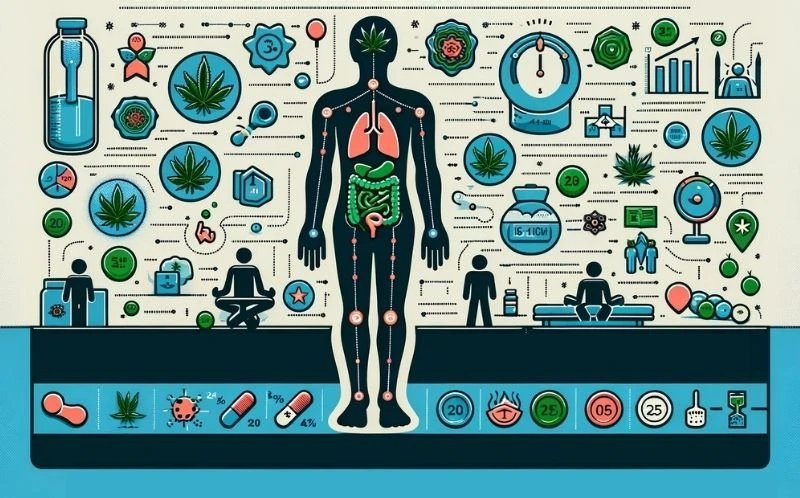
Contact Us If You Need Help
It's not uncommon to experience a learning curve as you discover the type of cannabis that best suits your needs, and you might encounter strains or products that don't agree with you. Patience and careful experimentation are key during this phase.
Don't be a stranger! Call us with any questions. We are happy to help!


